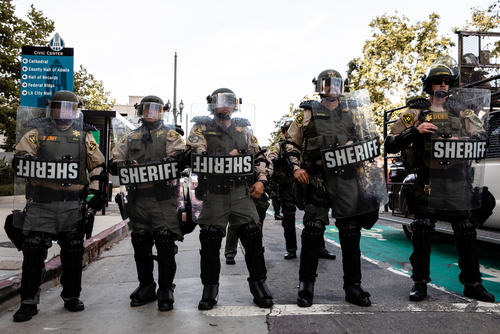
In a shocking and tragic turn of events, four employees of the Los Angeles Sheriff’s Department took their own lives within a 24-hour period. The news has sent shockwaves through the law enforcement community and beyond, highlighting the urgent need for mental health support among our brave first responders.
Among the deceased was retired Sergeant Greg Hovland, whose body was discovered at his home on Monday. The connection between the four victims, if any, remains unclear. This devastating incident underscores the harsh reality that those who dedicate their lives to protecting others often grapple with unseen battles of their own.
Four suicides in 24 hours of current/former LA Sheriff's Dept. employees? And they're calling it "unrelated?" This is tragic, but it also feels like the setup for a 90s action movie. https://t.co/hZvZWYuFJ8
— The Night of the FakeRobHunter (@FakeRobHunter) November 8, 2023
A study conducted in 2022 revealed that law enforcement officers face a 54% higher risk of suicide compared to the civilian population. Despite a 3% decrease in national suicide rates from 2019 to 2020, according to data from the Centers for Disease Control and Prevention (CDC), the rates among first responders showed little to no decrease between 2017 and 2020.
These alarming statistics underscore the urgent need for comprehensive mental health support for our law enforcement officers. It is crucial that we, as a society, acknowledge the immense pressure these individuals face daily and provide them with the necessary resources to cope with their stress and trauma.
Four current and former LA Sheriff's Department employees committed suicide within a 24-hour period.#californiadaily #suicide #sheriffs #police #LAPD #LosAngeles #death #stress #ohio #bluewave#SoojinSoloDebut pic.twitter.com/JQZ2dqsZjE
— californiadaily (@californiaDY) November 8, 2023
The tragic loss of these four officers serves as a stark reminder of the silent struggles many of our first responders face. It is a call to action for us to prioritize mental health initiatives within our law enforcement agencies and ensure that those who protect us are themselves protected.
While we mourn the loss of these brave individuals, let us also use this tragedy as a catalyst for change. We must advocate for policies that prioritize mental health support for our law enforcement officers and push for reforms that address the unique challenges they face.
As we continue to grapple with this tragic event, it is important to remember that help is available. The National Suicide Prevention Line offers confidential support and can be reached at 1-800-273-8255.
In the face of such a tragedy, we must come together as a community to support our law enforcement officers. We owe it to them to ensure they have access to the mental health resources they need to carry out their duties safely and effectively
In conclusion, this tragic event underscores the urgent need for mental health support within our law enforcement agencies. As we mourn the loss of these brave individuals, let us also commit to advocating for the necessary reforms to protect those who protect us.












